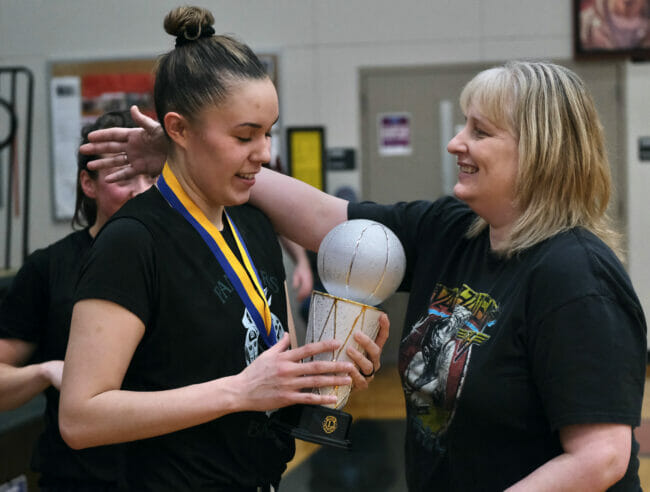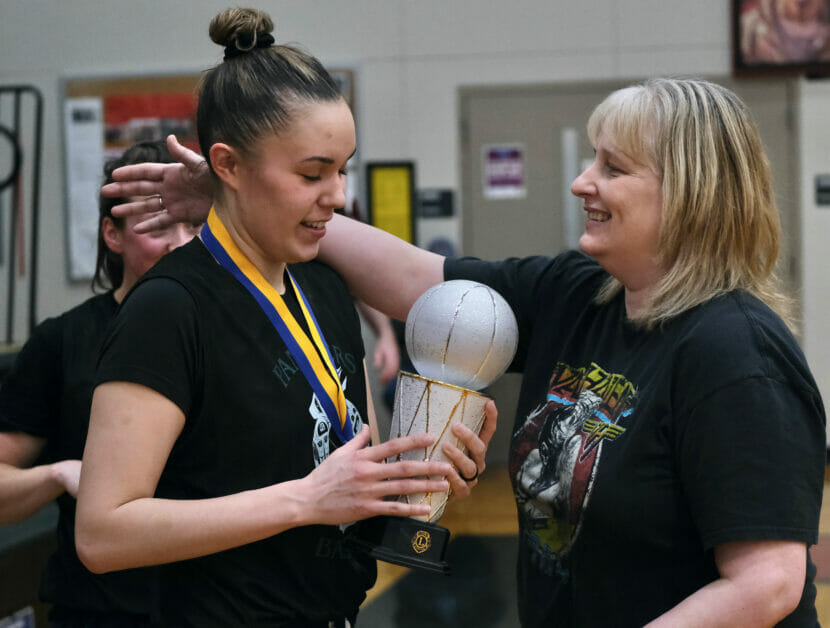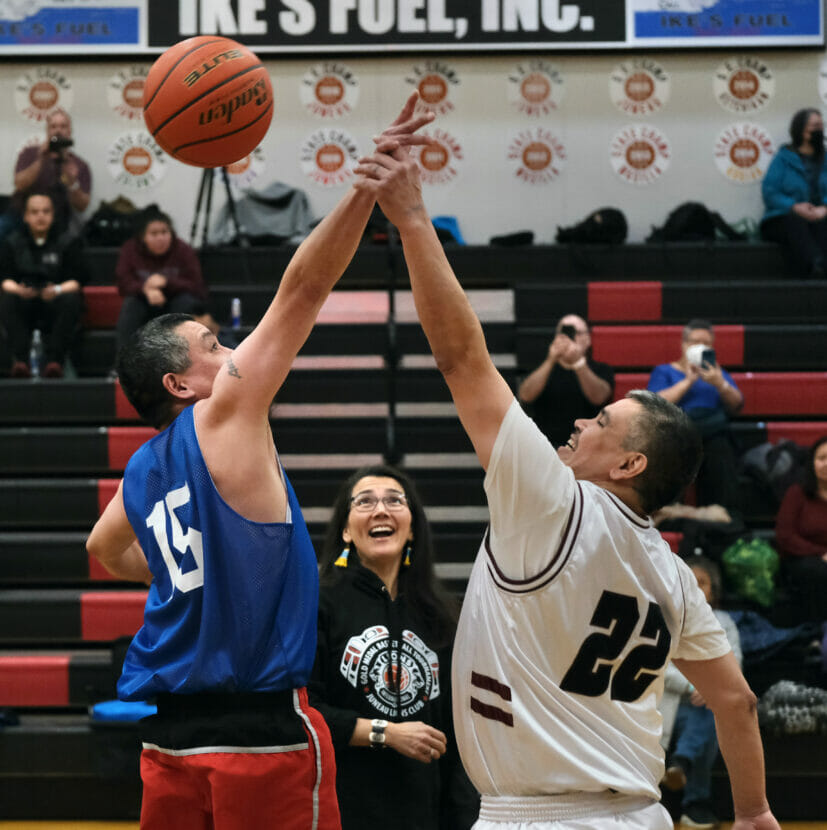
The Gold Medal Basketball Tournament was a familiar favorite for Southeast Alaska athletes for decades, until the COVID-19 pandemic hit the pause button. Last week, players took to the court at Juneau-Douglas High School: Yadaa.at Kalé for the first time in four years.
Reporter Klas Stolpe covered part of the tournament for the Juneau Empire. He spoke with KTOO’s Chloe Pleznac about some of the highlights and history of this beloved event.
This interview has been edited for length and clarity.
Chloe Pleznac: Thank you so much for joining me today to talk about the Gold Medal basketball tournament last week. I wanted to start off just by asking how many teams participated in the tournament and where were they from?
Klas Stolpe: Well, they have four brackets and there’s a B bracket, a C bracket, Masters bracket and women’s bracket. And so you have eight teams in the B bracket, eight teams in the C bracket and six teams apiece in the Masters and women’s bracket. And they come from all over Southeast. You got Angoon, Haines, Hoonah, Hydaburg, Juneau, Kake, Metlakatla and Yakutat and Hydaburg. Usually don’t get a Juneau team in, usually if someone drops out at the last minute. And in this instance, I think Wrangell backed out of their entries, just couldn’t find enough players.
Chloe Pleznac: So how did it go over the week who came out on top?
Klas Stolpe: Well, in the B bracket, which is kind of the more elite players. The entry from Juneau won this this bracket, then they defeated perennial power Hydaburg, and it was awesome, awesome tournament games in the beat all year long, all tournament long, I should say. And Juneau won 86 to 62 in the championship game. The C bracket which is 32 years and older, again, the FilCom Juneau team defeated Klukwanw 79 to 49. And the Masters bracket which is 42 years and older, Hoonah defeated the Juneau team 64 to 43. And in the women’s bracket, Prince of Wales defeated Yakutat 79 to 38. And of course, there’s interesting stories in every bracket, which makes the tournament a lot of fun if you’re a media person.

Chloe Pleznac: Well, that’s awesome. Was there any cultural significance that you noticed while covering this event?
Klas Stolpe: It’s funny because in Southeast Alaska, culturally, basketball has always and probably will always be just huge. I myself, you know, grew up in Petersburg, Alaska, before the internet age and before cell phones, and I still have lifelong friends that I’ve met across Southeast through basketball. Its course is really big in rural Alaska and the small communities and larger ones. They always share common courts when they play. Originally this tournament started in 1947. A Boy Scout executive for Southeast Alaska, his name was Dell Hanks, he had traveled all around Southeast on his missions, and he noticed how big basketball was. And he was talking to the Juneau Lions Club and they got this idea to start this tournament. So that said, it slowly gathered, it steamrolled over the years into this major tournament. And while it originally started with community pride, and gathering and seeing opponents and old friends again and again, and establishing and strengthening relationships. You usually at these tournaments, will have a couple of special activities during the week there. You know, there’ll be a Native dance group, a local cheerleading group. There’s usually a welcoming blanket dance where the names of every tribe are pronounced out and people in the stands will come down and of course, we always have frybread that’s passed out and the lobby is filled with vendors and the stands with fans and, of course, there’s some thick skinned referees. So yeah, it becomes a huge fun event.
Chloe Pleznac: Was there anything that surprised you covering this?
Klas Stolpe: Cassie Williams, she was the MVP of the women’s bracket. And she remembered when I interviewed her, she remembered traveling to the tournament as a kid and watching her mom and play and win a women’s championship. And now it’s 20 years later, and two of her mom’s teammates were on this year’s team. And her mom was in the stands watching Cassie win a championship so that was cool. Wow. And and then, in Juneau, do you notice FilCom a guy named Alex Heumann dreamed of winning a gold medal championship with his youth and high school teammate Larry Cooper. Plus he was playing for a family member who had passed and so they won a championship together. And Metlakatla’s Willie Hayward, who is just an icon in Southeast basketball, he was playing with his son. And Hydaburg’s Matt Carle – who was another icon and now he’s, he’s moved to Juneau – he was playing with his son Jaren on the Hydaburg team. You get all these little. I mean, it’s just families gathering, and very good competition. Hydaburg, Vinnie Edenshaw, I mean, he’s the smallest player on the court. But he was the tournaments, leading scorer. And there’s a great game well, Hydaburg defeated Angoon in a double elimination game was double overtime. And Hydaburg trailed by two points with .03 seconds remaining in the game, and the aforementioned Edenshaw on the line. So everyone thinks he’s going to tie this game up. But he misses the first free throw, so he had to miss the second, and the ball bounced back out and was tipped in the air by his teammate, George Peratrovich. And it tied the game and ascended into the second overtime and Heidelberg advanced. So that was pretty cool.
Chloe Pleznac: Wow, that’s, that is pretty cool. Thank you for telling that story. And thank you so much for taking the time to speak with me. I really appreciate it.






